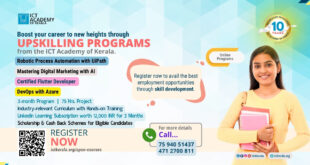We professionals have a nasty inclination of enjoying the routine work schedule and always love to work within the comfort zone and reluctant to change. We are ignorant that in future our knowledge becomes obsolete and there is a high chance that we may lose the race to competition. Majority of us love to walk in a beaten path and hesitant to think out-of-the-box and travel in an unexplored path. There is a huge probability that you will become clueless once your career progression hits a wall, or you lose the passion in your job, or your skills become obsolete and you may lose out to competition. Suddenly there will be a phase which you will try to dig out the strategies to bail you out from the current fiasco and curse your redundancy in past where you could have insured yourself by augmenting your skill set.
This makes the distinction between a run of the mill and a Smart professional. A sharp professional will ensure that their skills are updated during the sunny days of their career and this will help them to sail smoothly during rainy days. Working professionals do take up a distant education program for Career Progression, Higher salary, to change the vertical, update the skills, or following his bliss!!! The reason may contrast, but the smartest way to plan out your career is always look for acquiring new skill sets through formal or informal education.
There are diverse way-outs to update the skills but the best and easiest way is to take-up a Distant Education program offered by an Institution with repute. The advantage of formal education is that the entire content will be designed in scientific method and presented to you in a sequential way. Hence the learning become easier and fast. Where as in informal way of learning you have to spend hell lot of time to dig out the appropriate content to learn, bond it in sequential method and finding material which is appropriate. Pre-learning itself will take tremendous toll out of you and it is time consuming, confusing and moreover, it requires acute determination as well because researching the contents to learn is a monotonous task.
This article is essentially to lend a hand to working professionals to choose an appropriate institution to take up higher studies in distant education mode. While selecting a distant education Institution, please keep the following in mind:
1. Paramount Rule is QUALITY! QUALITY & QUALITY ONLY – Understand that doing a program is to enhance and update your skill sets, so look for a quality program. The Himalayan blunder professionals do while they pick-up a Distance Education program is selecting an institution which gives certificates without much strenuous examination. “Diploma / Graduate mill†institutions charge unsuspecting students thousands of rupees for worthless degrees, whereas credentialed, trustworthy institutions are able to give their students degrees / diplomas to be proud of. Go for the program which has got a reputation for quality. Please understand that HR department professionals are not fools and they are well informed about the quality of institutions and programs they offer. HR professionals can easily make out the quality of the program, the effort you would have taken to obtain the certificate and content you would have learned from this program. Basic thump rule is you cannot fool the HR of private professional Organization. Go for Quality – Not price / easy route.
2. Course Material: Try to enroll in an institution which provides the entire courseware. Else, for the mandatory examination purpose, you may need to run from Pillar to Post to obtain suitable books and journals. Though the content can be sourced from net, the process is tedious and tiresome. Keep it in mind, all these work have to be done after your routine office work.
3. Case Method Learning: It would be really beneficial if you can enroll into a course which uses at least in a minimal level ‘Case Method of Learning’. Knowledge is essentially about practice, not merely a set of academic theories. Case studies are developed around real life situations and by analyzing cases, you will learn key concepts through their application.
4. Flexibility: Please keep it my mind that the studies should not affect your current job. As part of academic requirement if the course mandatorily requires you to do project work or compulsory attendance in campus for certain duration, it may not suit some professionals. If your job does not offer the comfort to take a break and do the mandatory internship or campus visit, there is high chance you may drop-out from the program.
5. Price: The sad truth is that quality diplomas / degrees are quite pricy. Your course would be expensive, so calculate whether the expense can be justified. Moreover, check out the entire cost including examination fee, alumni fee etc.
6. Branch Network: It would be appropriate if the Institution has branch / contact point near you. Else, corresponding / communicating them are quite cumbersome. Centralized communication process has its own flaws.
7. Contact classes: The crux of distance education is self learning, but if the institution offers some contact classes, it can immensely help you to pursue and complete the program. Even some doubt clearing session can really makes things easier.
8. Flexibility in Duration of Program: Even if you were a bright student during your college days, it is difficult to complete the distant education program in the stipulated time. Do not assume that the reason is due to your diminishing cerebral capacity – its’ because you have set education in a lower priority now. During your school and college days, education was your first priority but currently your job will take over the Number Uno priority, then comes family, your social commitments, hobbies etc. Most of the people set the distant education as one of our last priority and in-turn people will find it difficult to complete the course in scheduled time. Hence take up program that gives the flexibility to extend the duration of the program. For example a 2 years program should be valid for minimum 4 years.
9. Examination Centers: Check whether the institution have examination center in the near-by place of your location. Travelling lot of distance for writing examination each time is quite tiresome task and some times it may not be feasible as well.
10. Transfer / Migration: Unlike earlier times, now professionals keep relocating to different locations. If the institutions where you pursue distant education program do not permit you to change your local center, it will be a stumbling block for you. Some institution may permit you to change the local center for only one or two times and even this can hamper the progress if migration of location is quite frequent for you.
11. Lab Facility of Computer based Programs: If you want to purse any computer based program check the availability of lab facility near your location. An out and out theory based computer program without lab facility is Idiotic.
12. Legal Status / Recognition of Institution: Check the recognition or accreditation of the institution
I know that an institution meeting the entire features listed above is not viable. According to your convenience you can drop some criteria except ‘Quality’ of the Institution / program. Do not dilute too much because Enrolling for a course is a major leap but completing it successfully is even more challenging.
What stops you to take up a Distant Education Program? C’mon start searching for a right institution to do your course…Once you enroll for a program, I will come back with tips to complete the program successfully.
Mr. Renjith G
Sr.Territory Manager
IFEN – Kerala.
(Views expressed are those of the author)
For information on various programs of ICFAI University, please contact:
ICFAI Group  – Trivandrum
Phone: Â 9961776636
 TechnoparkToday.com – Techies News, Jobs, Events & Lifestyle! Technopark News Jobs & Lifestyle!
TechnoparkToday.com – Techies News, Jobs, Events & Lifestyle! Technopark News Jobs & Lifestyle!




can anybody suggest some institutions that provide distance MBA, that meets atleast 60% of the above mentioned criteria?